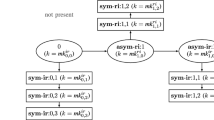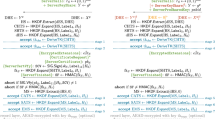Abstract
Communication network has grown to the stage where it becomes ubiquitous. It allows us to access to on-line services at anytime, anywhere and by any devices. This brings out new services, that was previous only accessible via computers, now are available on mobile devices such as e-commerce applications. These applications require mobile users to be authenticated in order to use the services. In this paper, we proposed a novel authenticated key agreement scheme that allows users and servers mutually authenticate each other. Our scheme also conceals users’ identities from adversaries; this is provided in initiator untraceability property of the scheme. Furthermore, the scheme has good computation cost as well as communication and storage costs; thus, the proposed scheme is suitable for the mobile devices.
Similar content being viewed by others
References
Burrows M., Abadi M., Needham R. (1990) A logic of authentication. ACM Transactions on Computer Systems 8(1): 18–36
Juang W. S. (2004) Efficient password authenticated key agreement using smart cards. Computers and Security 23(2): 167–173
Juang W. S. (2004) Efficient multi-server password authenticated key agreement using smart cards. IEEE Transactions on Consumer Electronics 50(1): 251–255
Juang W. S., Chen S. T., Liaw H. T. (2008) Robust and efficient password-authentucated key agreement using smart cards. IEEE Transactions on Industrial Electronics 55(6): 2551–2556
Juang W. S., Nien W. K. (2008) Efficient password authenticated key agreement using bilinear pairings. Mathematical and Computer Modelling 47(11–12): 1238–1245
Kocher P., Jaffe J., Jun B. (1999) Differential power analysis. Advances in Cryptology: Proceeding of CRYPTO 99: 388–397
Ku W. C., Chen S. M. (2004) Weaknesses and improvements of an efficient password based remote user authentication scheme using smart cards. IEEE Transactions on Consumer Electronics 50(1): 204–207
Li X., Qin W., Zheng D., Chen K., Li J. (2010) Anonymity enhancement on robust and efficient password-authentucated key agreenent using smart cards. IEEE Transactions on Industrial Electronics 57(2): 793–800
Messerges T. S., Dabbish E. A., Sloan R. H. (2002) Examining smart-card security under the threat of power analysis attacks. IEEE Transactions on Computers 51(5): 541–552
Author information
Authors and Affiliations
Corresponding author
Rights and permissions
About this article
Cite this article
Chang, CC., Le, HD. & Chang, CH. Novel Untraceable Authenticated Key Agreement Protocol Suitable for Mobile Communication. Wireless Pers Commun 71, 425–437 (2013). https://doi.org/10.1007/s11277-012-0822-0
Published:
Issue Date:
DOI: https://doi.org/10.1007/s11277-012-0822-0




